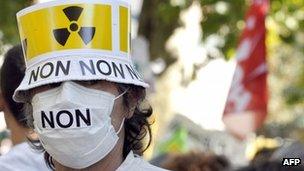Parties clash over future of nuclear power in France
- Published

The Socialists say they will phase out 24 of France's 58 reactors
France's government has accused the opposition Socialists of planning to undermine the nuclear industry in return for Green party support.
It said the proposed closure of nearly half of France's nuclear power stations would result in soaring domestic electricity bills as well as job cuts.
Socialist presidential candidate Francois Hollande denied planning to abandon nuclear energy.
Opinion polls suggest he will defeat Nicolas Sarkozy in next year's vote.
On Tuesday, the two opposition parties sealed an electoral pact under which the Socialists will not stand in a number of constituencies, thereby giving the Greens the prospect of at least 15 seats in the new parliament.
In return, the Greens will support Mr Hollande in the expected run-off round of the presidential election.
'Safety concern'
The Socialists undertook to reduce France's dependence on nuclear energy for its electricity from 75% to 50% by 2025.
This would entail the phasing out of 24 of the country's 58 reactors, though the Socialists would not agree to stop the construction of a new-generation nuclear reactor at Flamanville in western France.
Green party leader Cecile Duflot hailed the deal as a "real break with the past".
Responding, Industry Minister Eric Besson described the proposed policy as "the death of the French nuclear industry, which is today one of the most powerful in the world".
On Thursday, France's nuclear safety agency, the IRSN, was handing over a report on radiation protection and nuclear safety to the country's nuclear watchdog, the ASN.
IRSN chief Jacques Repussard was quoted by Reuters news agency as saying in an interview that France needed to upgrade the protection of vital functions in all its nuclear reactors to avoid a disaster in the event of a natural calamity.
"For example, it is necessary that each reactor has at least one protected independent diesel generator positioned out of the way which does not fail even in case of an extremely violent earthquake," he said.
- Published12 September 2011
- Published21 July 2011